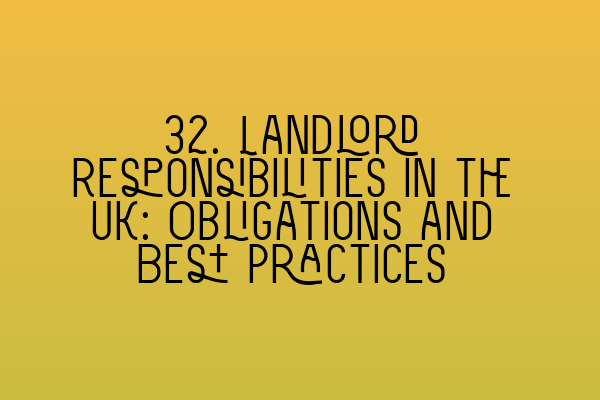Welcome to another informative blog post from SQE Property Law & Land Law! Today, we will be diving into the responsibilities of landlords in the UK and the best practices they should follow. Whether you are a landlord yourself or a tenant seeking to understand your rights, this article will provide valuable insights.
As a landlord in the UK, it is crucial to understand your legal obligations towards your tenants. These obligations ensure that your property is safe, habitable, and meets the required standards. Failure to fulfill these responsibilities can lead to legal consequences and damage to your reputation. Therefore, it is essential to stay informed and proactive. Let’s take a closer look at the key landlord responsibilities.
1. Provide a safe environment:
The safety of your tenants should be your top priority. It is essential to ensure that your property meets all the necessary safety regulations. This includes maintaining gas and electrical appliances and arranging regular safety inspections. It is also advisable to have smoke alarms and carbon monoxide detectors installed.
2. Repairs and maintenance:
As a landlord, you have a responsibility to maintain the property in a good state of repair. This includes promptly addressing and fixing any issues that may arise. Regular maintenance checks should be conducted to identify potential problems. It is important to have a clear understanding with your tenants regarding reporting maintenance issues and promptly addressing them.
3. Tenancy agreements and deposit protection:
Providing a comprehensive and legally compliant tenancy agreement is vital. This agreement should outline the terms and conditions of the tenancy, such as rent payment dates, deposit amounts, and expectations for property upkeep. Additionally, it is a legal requirement to protect your tenant’s deposit in a government-approved deposit protection scheme.
4. Compliance with legal requirements:
Landlords must adhere to various legal requirements. This includes ensuring the property meets minimum standards for energy efficiency, obtaining necessary licenses (such as an HMO license for House in Multiple Occupation), and complying with fire safety regulations. Staying updated with the latest legislation is crucial to avoid any legal issues.
5. Communication and respect for privacy:
Maintaining effective communication with your tenants is essential for a smooth landlord-tenant relationship. Responding promptly to queries, providing relevant information, and respecting your tenant’s privacy rights are key aspects. Prior notice should be given before entering the property, except in emergencies.
6. Protection from discrimination:
Under the Equality Act 2010, landlords are prohibited from discriminating against tenants on the basis of protected characteristics such as race, gender, religion, or disability. It is essential to treat all prospective and current tenants fairly and equally.
Now that we have covered the key responsibilities of landlords in the UK, let’s discuss some best practices that can help you excel in your role.
1. Regular property inspections:
By conducting regular property inspections, you can identify any maintenance issues early on and address them promptly. This proactive approach can help minimize potential problems and ensure tenant satisfaction.
2. Clear communication channels:
Establishing clear lines of communication with your tenants is crucial. This allows tenants to report any issues or concerns promptly, enabling you to take appropriate action swiftly. Responding to tenant queries and addressing their concerns in a timely manner creates a positive landlord-tenant relationship.
3. Professional property management:
Consider using professional property management services to handle day-to-day tasks, such as managing repairs, collecting rent, and conducting inspections. This can help streamline operations and ensure compliance with legal regulations.
4. Stay informed:
The legislative landscape for landlords is constantly evolving. Stay up to date with changes in regulations and seek professional advice if needed. SQE Property Law & Land Law offers comprehensive SQE courses that cover the latest legal updates for aspiring solicitors.
By following these best practices, you can not only meet your legal obligations but also create a positive renting experience for your tenants. Remember, being a responsible landlord is not only about fulfilling legal requirements but also about fostering a positive and harmonious relationship with your tenants.
For further information on landlord responsibilities and legal obligations, you can explore our SQE preparation courses and SQE practice exams. Understanding the legal framework will empower you to navigate the property law landscape effectively.
Thank you for reading this blog post from SQE Property Law & Land Law. If you have any questions or would like any further information, feel free to reach out to us. We are here to help you navigate the complex world of property law in the UK.
Related Articles:
–SQE 1 Practice Exam Questions
–SQE 1 Practice Mocks FLK1 FLK2
–SQE 2 Preparation Courses
–SQE 1 Preparation Courses
–SRA SQE Exam Dates
